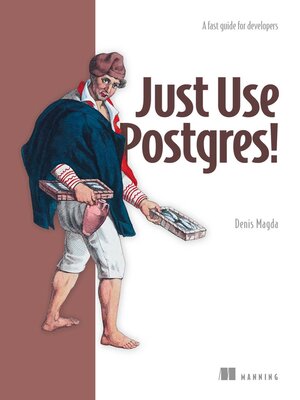
Sign up to save your library
With an OverDrive account, you can save your favorite libraries for at-a-glance information about availability. Find out more about OverDrive accounts.
Find this title in Libby, the library reading app by OverDrive.



Search for a digital library with this title
Title found at these libraries:
| Library Name | Distance |
|---|---|
| Loading... |
You probably don't need a collection of specialty databases. Just use Postgres instead!
Need a fast, reliable SQL-compliant RDBMS? Just use Postgres! Need to work with geospatial data? Just use Postgres! Handling semi- or non-structured documents? Just use Postgres! Generative AI embeddings? You've got it—just use Postgres! Written for software engineers and database pros, Just Use Postgres! shows you how to get the most out of the powerful PostgresSQL database.
In Just Use Postgres! you'll learn how to:
Develop generative AI, geospatial, and time-series applications
Everything from transactional RDBMS services to specialized workloads
Modern SQL including window functions, CTEs, and JSON data
Implement full-text search
B-trees, GIN, HNSW, expression, and more
Postgres extensions
Since its initial release in 1996, PostgreSQL, aka Postgres, has grown into the most popular and powerful full-featured open source RDBMS available. Just Use Postgres! takes a modern look at Postgres, exploring the database's most up-to-date features for AI, time-series, full-text search, geospatial, and other application workloads.
About the book
Just Use Postgres! uses relevant concrete examples to show you how to interact with Postgres as a software developer. Each chapter focuses on a different use case, including an eCommerce application, a music streaming service, and other interesting challenges. You'll explore the Postgres techniques, features, and capabilities you need to streamline each app's unique data management issues. From fundamental RDBMS features to an ecosystem of extensions for generative AI and more, you'll learn how to get the absolute best out of Postgres.
About the reader
For software developers who know the basics of SQL and relational databases.
About the author
Denis Magda is a software engineer who started his career at Sun Microsystems and Oracle, working on the Java platform and leading one of the Java development teams. After mastering Java from the inside, he ventured into the world of Postgres and other databases, where he has stayed ever since.
Need a fast, reliable SQL-compliant RDBMS? Just use Postgres! Need to work with geospatial data? Just use Postgres! Handling semi- or non-structured documents? Just use Postgres! Generative AI embeddings? You've got it—just use Postgres! Written for software engineers and database pros, Just Use Postgres! shows you how to get the most out of the powerful PostgresSQL database.
In Just Use Postgres! you'll learn how to:
Since its initial release in 1996, PostgreSQL, aka Postgres, has grown into the most popular and powerful full-featured open source RDBMS available. Just Use Postgres! takes a modern look at Postgres, exploring the database's most up-to-date features for AI, time-series, full-text search, geospatial, and other application workloads.
About the book
Just Use Postgres! uses relevant concrete examples to show you how to interact with Postgres as a software developer. Each chapter focuses on a different use case, including an eCommerce application, a music streaming service, and other interesting challenges. You'll explore the Postgres techniques, features, and capabilities you need to streamline each app's unique data management issues. From fundamental RDBMS features to an ecosystem of extensions for generative AI and more, you'll learn how to get the absolute best out of Postgres.
About the reader
For software developers who know the basics of SQL and relational databases.
About the author
Denis Magda is a software engineer who started his career at Sun Microsystems and Oracle, working on the Java platform and leading one of the Java development teams. After mastering Java from the inside, he ventured into the world of Postgres and other databases, where he has stayed ever since.







